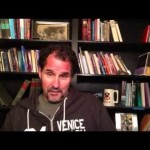We run our website the way we wished the whole internet worked: we provide high quality original content with no ads. We are funded solely by your direct support. Please consider supporting this project.
Baby Universalism and Reasonable Infanticide
Here’s a perfectly random brain stimulator:
In contemporary western Christianity it is almost universally assumed that deceased babies automatically go to heaven. I call this the doctrine of “baby universalism” (similar to “canine universalism” = “all dogs go to heaven”). There are a few scriptural passages that can be used to support this perspective (e.g. 2 Sam.12:23), but no one who thinks seriously about the matter claims that these few verses force this conclusion. In fact, baby universalism has been comparatively rare throughout church history prior to the modern era. (The dominant view has been that baptized babies go to heaven while unbaptized babies go to hell. Calvin and Luther said something similar, but exchanged “baptism” for “election”).
While I think its extremely important for parents of deceased children to be assured that their children are under the loving care of Jesus, I do not believe this means that they by-pass the growing, refining processes we who live into adulthood go through, which is what baby universalism entails. There are two closely related negative consequences to baby universalism that I’d like to address.
First, the most common explanation as to why humans (and, I would add, angels) were given free will — and thus the potential to massively screw things up like we have — is because God’s primary objective in creation is love, and genuine love is not possible where there is no free will. I accept this line of argumentation (I defend it over several chapters in Satan and the Problem of Evil). In fact, I think it’s a foundational aspect of any theodicy that hopes to be viable. Yet, it seems to me that if baby universalism is true, the free will defense falls apart. If deceased babies are able to automatically enter into a fully complete loving fellowship with God without having to make any choice, then free will is obviously not necessary to enter into a fully complete loving relationship with God. Why then did God introduce free will in creation? It only introduces the unnecessary risk that humans (and angels) will choose poorly, screw up creation and bring misery and destruction on themselves and others.
My second concern is that I frankly don’t see how infanticide can be rendered unreasonable, let alone evil, if one embraces baby universalism. Several years ago a local lady murdered her 12 yr.-old-son because she became concerned he might go down “Satan’s path,” reject Jesus and end up in hell (which, in her theology, meant he’d experience hopeless nightmarish suffering forever). The newspapers made this lady out to be a crackpot, but, while I don’t doubt she had mental issues, the logic she gave in her interview with the newspaper was impeccable. What loving mother would not kill their beloved child if doing so guaranteed them that their child would receive eternal happiness while not doing so kept open the possibility (or, as this lady believed, the likelihood) that their child would spent eternity in hell?
Paul Copan tries to argue against this line of thought in Is God a Moral Monster? (Baker, 2008). He appeals to the doctrine of baby universalism (he doesn’t call it that) to justify the killing of infants and children by the Israelites during the invasion of Canaan (189, 94). With admirable honestly and courage, he then asks: “Why not kill all infants to make sure they are with God in the hereafter” (194)? Paul answers his own question by noting that the Israeli soldiers killed infants only because God told them to do so. When anyone commits infanticide without God’s permission, Paul adds, they are sinning, for only God the giver of life has the right to take life (or command others to take life). Paul concedes that a murdered baby automatically receives a “heavenly benefit,” but he insists this is not to the credit of the killer and thus cannot be used to justify their killing. “The killer neither causes these [heavenly] benefits nor is responsible for them” (194).
I can easily see why, within the doctrine of baby universalism, a baby killer should not be considered the cause for the deceased baby’s heavenly benefit or held responsible for the deceased baby’s heavenly benefit. But it seems to me that the baby killer must still be viewed as the occasion and means of the baby’s heavenly benefit. Most importantly, it seems we must accept that the baby killer is the means by which the baby’s heavenly benefit is made secure. The baby killer in effect saved the baby from the possibility of hell! While this still wouldn’t remove the sin of infanticide — for it still violates a command of God — it does renders infanticide reasonable, if not loving and courageous — if one accepts that baby universalism is true.
This strikes me as constituting a rather strong reductio ad absurdem argument that baby universalism is false. As I suggest in Satan and the Problem of Evil (380-85), if love must be chosen and our characters must be made fit for heaven, then when this doesn’t happen in this life (because of premature death or any other reason), we can assume it somehow happens in the next. This is of course a speculative conclusion, but so is baby universalism! The difference is that my proposed speculation doesn’t undermine the free will defense or render infanticide reasonable.
Think about it.
Peace
Category: General
Tags: Afterlife, Problem of Evil, Salvation
Related Reading

Video Q&A: Do you think Jehovah’s Witnesses and Mormons are saved?
Does Greg believe that everyone goes to Heaven regardless of their beliefs? Find out here.

Sermon: Letter to Henry
We usually share a short clip from Greg’s sermons here, but we decided that a clip just won’t do this week. This last weekend Greg preached about the life and death of Henry and what it does and does not say about God. You can listen to the sermon and download other resources over at…

The Incarnation: More Than a Rescue Mission
A mistake people often make concerning the Incarnation is that they fail to distinguish the eternal plan of God to unite himself with humanity in Christ, on the one hand, from the atoning significance this plan acquired after the fall, on the other. Some therefore think of the Incarnation as a sort of “Plan B”…

When Free Will Meets Unfathomable Evil
In the face of tragedy Christians unfortunately tend to recite clichés that attempt to reassure people that, however terrible things seem, everything is unfolding according to God’s mysterious plan. We hear that “God has his reasons”; “God’s ways are not our ways”; “God is still on his throne”; “God doesn’t make mistakes,” and things of…

The Cross and Cosmic Warfare
Since the time of Anselm in the 11th century, Western theology has focused almost all of its attention on the anthropological dimension of the atonement. In the most popular understanding, the chief thing that God was accomplishing on the cross was satisfying God’s perfect justice and thereby atoning for our sins. The work of the…

When does salvation happen?
Question: I grew up in a strict, fundamentalist community and our whole goal in life was to get people to pray “the sinners prayer.” Once they prayed this prayer, we believed, they were “saved.” But the vast majority of these people went on living like nothing happened. I’m now questioning if this is the right…
